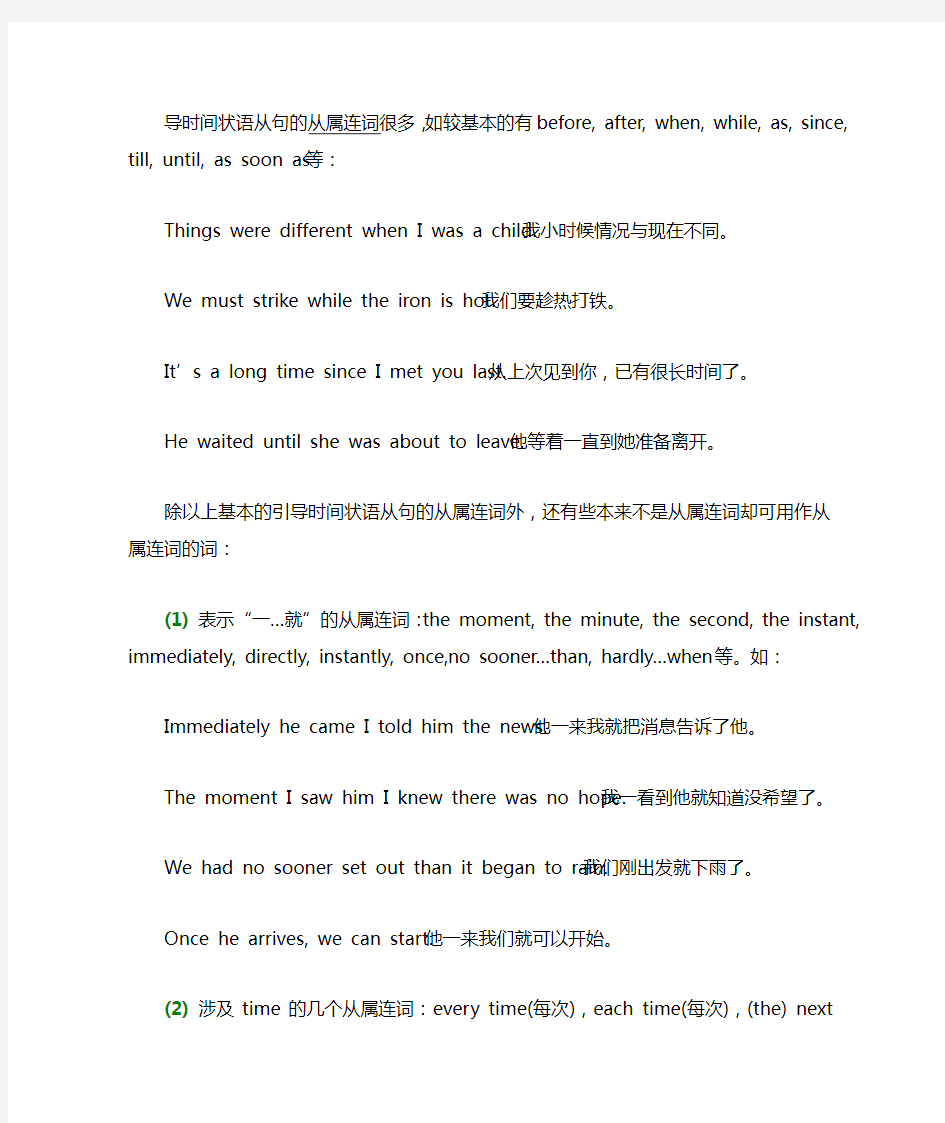
时间状语从句的从属连词
- 格式:doc
- 大小:45.00 KB
- 文档页数:5


导时间状语从句的从属连词很多,如较基本的有before, after, when, while, as, since, till, until, as soon as 等:
Things were different when I was a child. 我小时候情况与现在不同。
We must strike while the iron is hot. 我们要趁热打铁。
I t’s a long time since I met you last. 从上次见到你,已有很长时间了。
He waited until she was about to leave. 他等着一直到她准备离开。
除以上基本的引导时间状语从句的从属连词外,还有些本来不是从属连词却可用作从属连词的词:
(1)表示“一…就”的从属连词:the moment, the minute, the second, the instant, immediately, directly, instantly, once, no sooner…than, hardly…when等。如:
Immediately he came I told him the news. 他一来我就把消息告诉了他。
The moment I saw him I knew there was no hope. 我一看到他就知道没希望了。
We had no sooner set out than it began to rain. 我们刚出发就下雨了。
Once he arrives, we can start. 他一来我们就可以开始。
(2)涉及time的几个从属连词:every time(每次),each time(每次),(the) next time(下次),any time(随时),the last time(上次),the first time(第一次)。如:
Every time I see her I’ll think of it. 每次我看到她,我就想起这事。
He felt nervous each time she spoke to him. 每次她和他讲话,他都感到紧张。
He didn’t tell me the last time I saw him. 我上次见到他时他没告诉我。
■与时间状语从句有关的时态问题
关于这个问题有两点值得注意:
(1)当主句为将来时态或具有将来意义时,时间状语从句通常要用一般现在时表示将来意义,而不能直接使用将来时态:
Turn off the lights before you leave. 走前关灯。
I will tell him as soon as he arrives. 他一来我就告诉他。
(2)与since 从句搭配的主句的时态通常是现在完成时态:
He has lived here since 1999. 自1999年以来,他就一直住在这儿。
Where have you been since I last saw you? 自我上次见到你之后你到哪里去了?
【注】在特定的语言环境中有时也可能用过去完成时或一般现在时:
It seems like years since we last met. 我们似乎几年未见面了。
Yesterday he told me that he hadn’t eaten anything since Tuesday. 他昨天告诉我自星期二以来他一直未吃任何东西。
时间状语从句
when, while 和 as 引导时间状语从句的用法
这三个词的意思很简单,都有“当……时候”的意思。但学生经常会问三个词的区别在哪儿,特别是在做选择题的时候。别说是学生,就我个人而言,做这样的选择题要保证百分之百的正确也是不可能的。现根据大量的实例和个人的思考,做一点小结,供大家参考。
一、when 的用法
如果只从现象来看,when 从句用的最多的是一般过去时,而主句的时态没有限制,根据具体情况而定。
1. When he was a child he was always trying out new ideas.
他小时候就常常试验一些新的设想。
2. When she came into my room, I was just reading a book. 她走进我房间时,我正在看书。
3. Were you writing when the teacher came in? 老师进来的时候,你在写信吗?
4. Sorry, I was out when you called me. 对不起,你打电话来的时候我出去了。
5. He was on the point of leaving when someone knocked at the door.
他正要走,这时有人敲门。
6. I thought of it just when you opened your mouth. 就在你要说话的时候,我也想到了。
7. I had hardly [scarcely] closed my eyes when someone knocked at the door.
我刚一闭上眼,就有人在敲门了。
根据以上的例句,我们可以总结出一点:when 从句的A事件,相当于另一个事件B发生的时间点。也就是说,when 从句的重点不在动作本身发生的状态,而只是把它作为一个时间点,所以when 多数情况下用的是一般过去时,则不用正在进行时。因为如果用正在进行时,它表示的就是一段时间而不是一个时间点了。根据这一点,有的文章补充说:when 从句的动词大多是瞬时动词。这种说法也可以参照。
实际上,when 从句也可以有其它的时态,但几乎也不用进行时,因为它也只是作为一个时间参照点。例如:
1. When I got to the airport, the guests had left. 当我赶到飞机场时,客人们已经离开了。
2. When he had finished his homework, he took a short rest.
当他完成作业后,他休息了一会儿。
3. Why do you want a new job when you have got such a good one already?
你已经找到如此好的工作,为何还想再找新的?
4. You shall borrow the book when I have finished reading it.
在我读完这本书后,你可以借阅。
5. When the manager comes here for a visit next week, I’ll talk with him about this.
下周,经理来这参观时,我会和他谈谈此事。
二、while 的用法
相比于when 来说,while 从句的侧重点就不一样了。while 从句的侧重点在于描述动作正在发生的状态,它的意思是:当while 事件正在发生的时候,另一件事如何如何。所以,while 从句一般用的是正在进行时。而另一件事的状态没有硬性的要求,根据具体情况而定。例如:
1. While my wife was reading the newspaper, I was watching TV.
当妻子正在看报纸的时候,我正在看电视。
2. While Jim was mending his bike, Lin Tao came to see him.
正当吉姆修自行车时,林涛来看他。
3. While they were talking, the bell rang. 正在他们谈话的时候,上课铃响了。